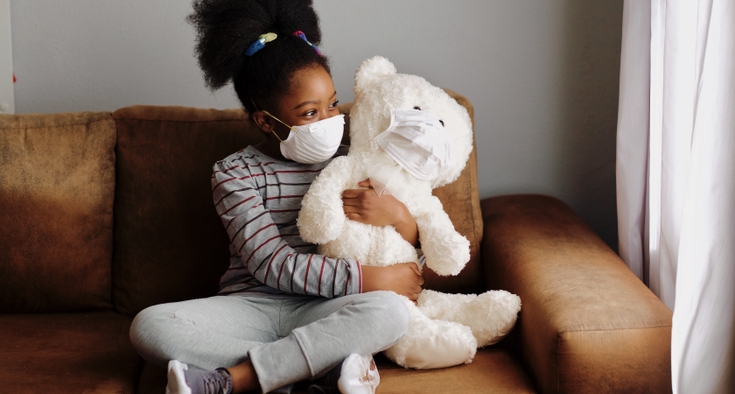Physicians are among the first to admit that adopting the new masking habits can be a difficult hurdle for families. But research shows that wearing a mask in public is one of the best ways to protect yourself and others from COVID-19.

Children are among those who have the hardest time wearing masks, but there are ways to help them adapt. Dr. Margaret Alden, a pediatrician at Novant Health Forsyth Pediatrics – Westgate, said it all starts with parents and caregivers setting good habits and attitudes about mask wearing. “Children’s attitudes come from their parents,” she said. “If parents want to help make their children successful in this, control the dialogue to make it positive and supportive.”
What advice do you have about how to talk to kids of different ages about masks?
When you’re asking someone to do something difficult, I think an age-appropriate ‘why’ is always helpful. For example, you don’t need to talk to a 5-year-old about immunology and cough spread. But you can talk about how wearing a mask is about taking care of your friends or keeping your teacher safe.
Give the appropriate amount of information without scaring them. Also, name the virus for them. Tell them COVID has made things different now and that they’re expected to help play a role. Parents can also play out real-life situations, so children feel better prepared for being in school or around other people.
Can a mask make you sick, create CO2 buildup or exacerbate asthma?
No. I think there are a lot of fears out there and some misinformation. We know that wearing a mask does not cause asthma or exacerbate asthma. It does not cause carbon dioxide buildup. There are no negative health impacts, other than perhaps some extra breakouts. It’s not going to cause a respiratory issue. In fact, a pediatrician I know is a runner and ran a 5K with a mask and oxygen monitor to demonstrate that her oxygen levels remained normal. For the most part, it’s just a mental hurdle to get over.
How young is too young to wear a mask?
The American Academy of Pediatrics recommends that children 2 and up wear masks. Children at these ages, and even younger, can be taught to wear glasses, hearing aids and other medical devices. Since COVID-19 is a respiratory virus and children are often coughing or sneezing, wearing a mask protects the other people in the room and makes sure we are all taking care of each other.
Have other questions? Schedule an appointment with a pediatrician
How can children become used to wearing a mask?
Start out by practicing wearing masks at home. One idea that I've been discussing with families has been timing – allow kids to work up to tolerating wearing a mask for longer periods of time. It can be difficult, even for me as a doctor. I suggest starting with small increments. Do it intentionally with increased amounts of time. You can even start with an hour while they're watching TV, doing something that distracts them, so that they have it on and begin to feel comfortable.
Is there a way to make wearing a mask fun?
I think children, like adults, like to show their personality and favorites with their mask choice. So, I encourage parents to get on different websites like Etsy, or their favorite sports team and let kids pick their masks. They feel involved in the decision and can show their personality, and then reward them for being willing to wear it.
How can parents and teachers reinforce good masking habits?
I encourage parents to use positive reinforcement when teaching children any skill. In this model, when a child shows a good behavior or choice, he or she is rewarded with a treat. This is often used at school – at the end of the week, children with good choices and behaviors are rewarded with some sort of acknowledgment.
In the time of COVID, children are being asked to do something new – wear a mask. It’s new for them and can be challenging. Positive reinforcement can help them overcome their discomfort. For example, reward or acknowledge a child who wears his or her mask for an allotted amount of time with something simple, such as a sticker or a Popsicle. Obviously, we don’t encourage too many sweets, but it can be an effective reward.
What other questions do parents have?
Some parents have asked if mask wearing will impact facial recognition for very young children, causing worry that children may not recognize the person wearing it. I haven’t found that to be the case. I’ve also heard concerns about isolation and reduced socialization, or face-to-face time with strangers. I do not believe that this will have a negative social impact in the long term. Children are incredibly adaptable. One abnormal school year will not throw off their social skills indefinitely. As a pediatrician, I always stress the resilience of children. It’s really a humbling part of their psyche, and one that makes it fun to take care of them.
Children are also aware of the changes and stresses that adults talk about and can have deep feelings about the changes to their environment and routine. Make sure you’re asking them about their feelings. Some of them are more afraid of going back to school than they are about wearing a mask. Some of them are concerned about their health or the health of others. It can be amazing what’s on the minds of children. Make sure you build a support network for your child and let them now it’s OK to be vulnerable and talk about how they feel. Approach this time with an open heart.






